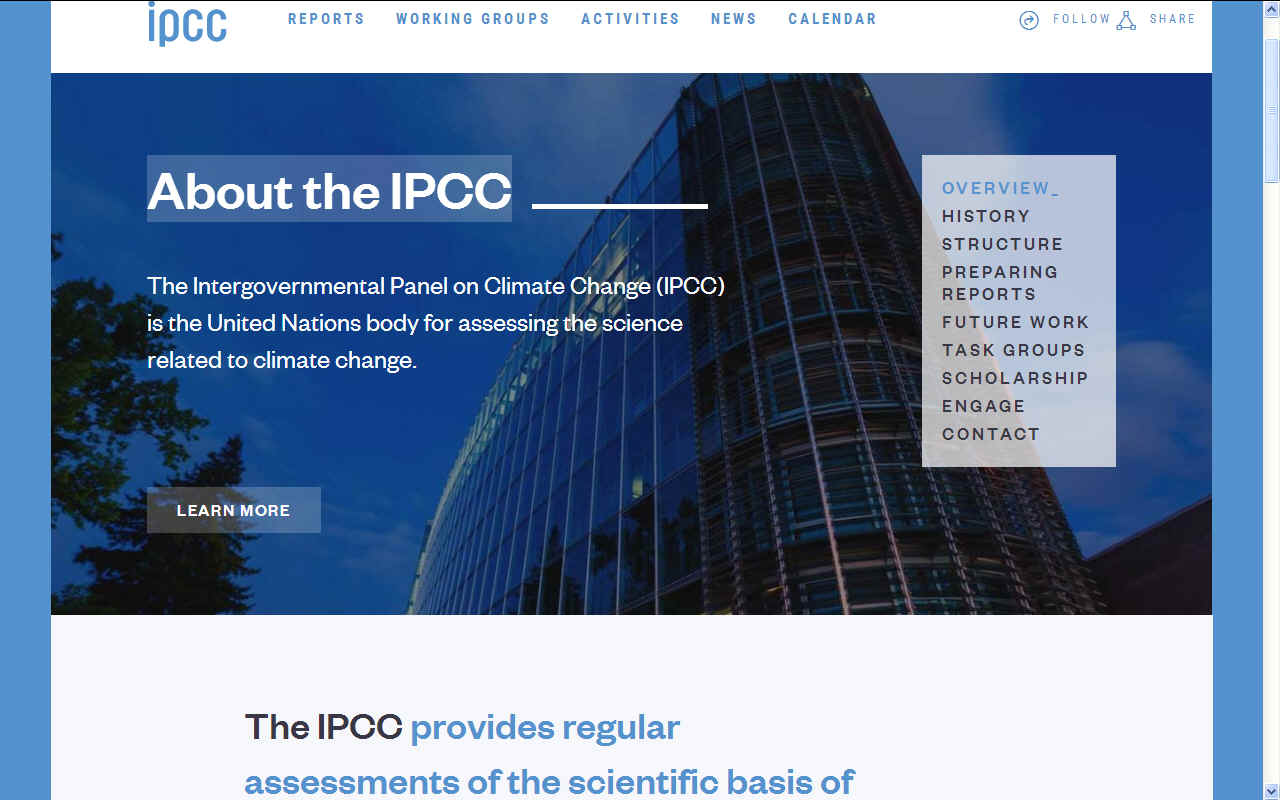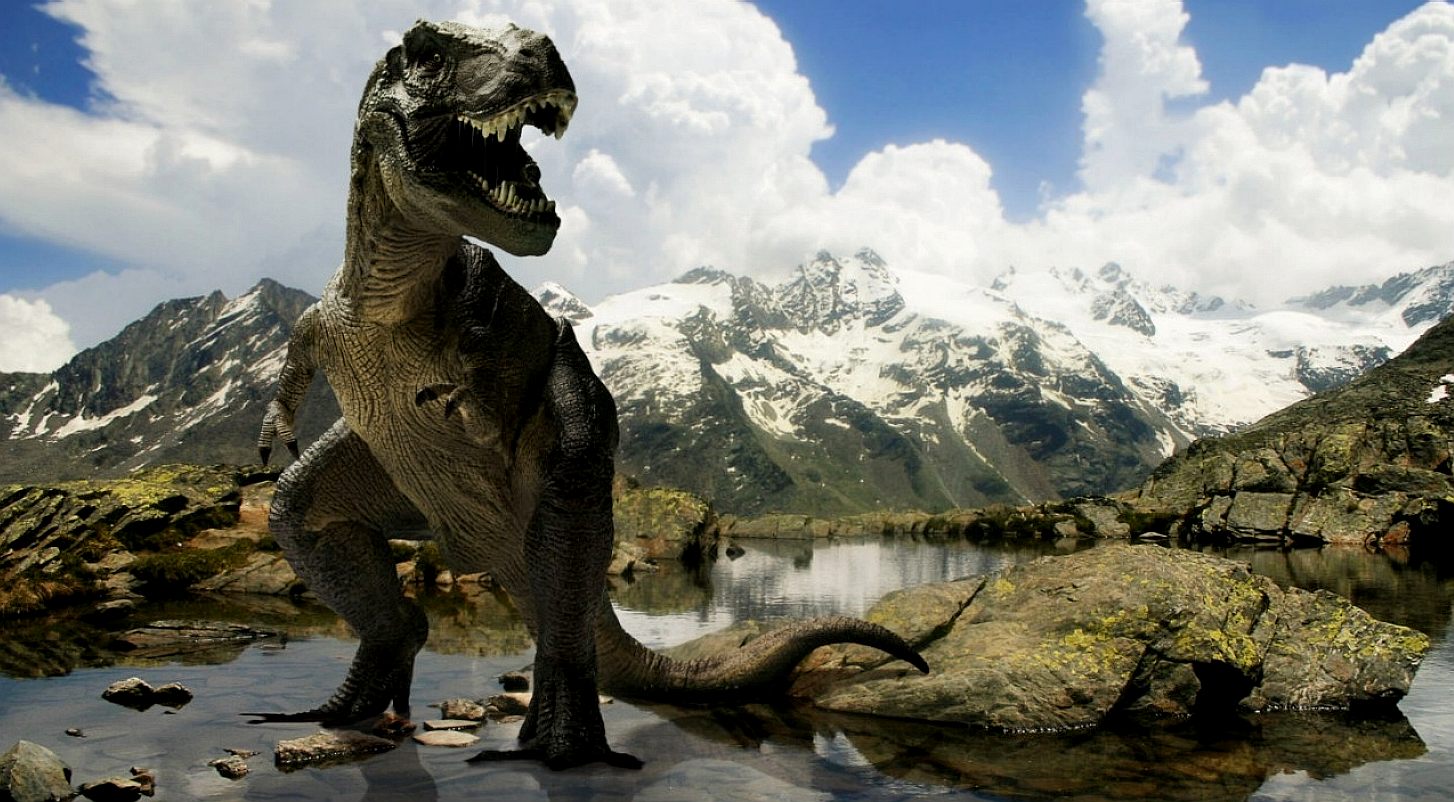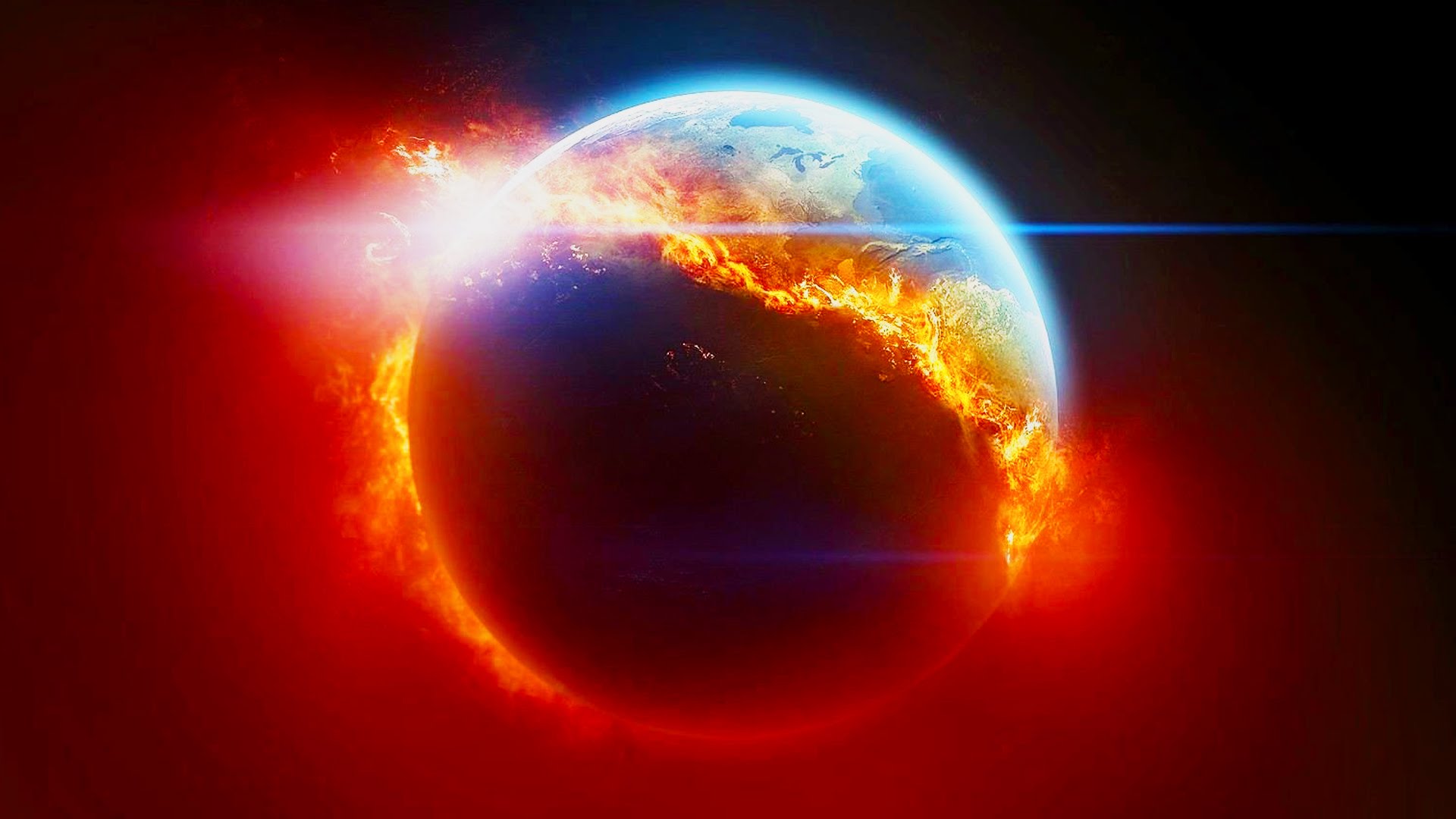|
IPCC
- UNITED NATIONS
Please use our A-Z INDEX
to navigate this site

UNITED
NATIONS IPCC -
The Intergovernmental Panel on Climate Change (IPCC) is the United Nations body for assessing the science related to climate change.
In August 2021, the IPCC published a Report that put the
accelerated warming of the planet as a Code
Red for humanity. The UN Secretary-General António Guterres said the Working Group's report was nothing less than "a
code red for humanity. The alarm bells are deafening, and the evidence is irrefutable".
He noted that the internationally-agreed threshold of 1.5 degrees above pre-industrial levels of global heating was "perilously close. We are at imminent risk of hitting 1.5 degrees in the near term. The only way to prevent exceeding this threshold, is by urgently stepping up our efforts, and
pursuing the most ambitious path.
"We must act decisively now, to keep 1.5 alive."
The UN chief in a detailed reaction to the report, said that solutions were clear. "Inclusive and green economies, prosperity, cleaner air and better health are possible for all, if we respond to this crisis with solidarity and courage", he said.
He added that ahead of the crucial COP26 climate conference in Glasgow in November, all nations -
especially the advanced G20 economies - needed to join the net zero emissions
coalition, and reinforce their promises on slowing down and reversing global heating, "with credible, concrete, and enhanced Nationally Determined Contributions (NDCs)" that lay out detailed
steps to achieve this very necessary climb down from economic
growth, to economic stability. How councils might deal with a
regressive situation and balance the books is the new
housekeeping challenge for 2022. The Cleaner Ocean Foundation
offers a free advice service to Councillors in the UK, the
basis of which is their 6 Point Plan. The UK, Europe
and all other countries around the world must move to zero
emission transport as quickly as practical, transitioning
from fossil fuels - since this is already in motion. If we
don't, humanity will experience
severe difficulties, with no way back.
ABOUT
IPCC
The IPCC provides regular assessments of the scientific basis of climate change, its impacts and future risks, and options for adaptation and mitigation.
Created in 1988 by the World Meteorological Organization (WMO) and the
United Nations Environment Programme (UNEP), the objective of the IPCC is to provide governments at all levels with scientific information that they can use to develop climate policies. IPCC reports are also a key input into international
climate change negotiations.
The IPCC is an organization of governments that are members of the United Nations or WMO. The IPCC currently has 195 members. Thousands of people from all over the world contribute to the work of the IPCC. For the assessment reports, IPCC scientists volunteer their time to assess the thousands of scientific papers published each year to provide a comprehensive summary of what is known about the drivers of climate change, its impacts and future risks, and how adaptation and mitigation can reduce those risks.
An open and transparent review by experts and governments around the world is an essential part of the IPCC process, to ensure an objective and complete assessment and to reflect a diverse range of views and expertise. Through its assessments, the IPCC identifies the strength of scientific agreement in different areas and indicates where further research is needed. The IPCC does not conduct its own research.
WORKING
GROUPS & TASK FORCE
The IPCC is divided into three Working Groups and a Task Force. Working Group I deals with The Physical Science Basis of Climate Change, Working Group II with Climate Change Impacts, Adaptation and Vulnerability and Working Group III with Mitigation of Climate Change. The main objective of the Task Force on National
Greenhouse Gas Inventories is to develop and refine a methodology for the calculation and reporting of national greenhouse gas emissions and removals.
Alongside the Working Groups and the Task Force, other Task Groups may be established by the Panel for a set time period to consider a specific topic or question. One example is the decision at the 47th Session of the IPCC in Paris in March 2018 to establish a Task Group to improve gender balance and address gender-related issues within the
IPCC.
ORGANIZATION
Korean economist Hoesung Lee has been the chair of the IPCC since 8 October 2015, with the election of the new IPCC Bureau. Before this election, the IPCC was led by Vice-Chair Ismail El Gizouli, who was designated acting Chair after the resignation of Rajendra K. Pachauri in February 2015. The previous chairs were Rajendra K. Pachauri, elected in May 2002; Robert Watson in 1997; and Bert Bolin in 1988. The chair is assisted by an elected bureau including vice-chairs and working group co-chairs, and by a secretariat.
The Panel itself is composed of representatives appointed by governments. Participation of delegates with appropriate expertise is encouraged. Plenary sessions of the IPCC and IPCC Working Groups are held at the level of government representatives. Non-Governmental and Intergovernmental Organizations admitted as observer organizations may also attend. Sessions of the Panel, IPCC Bureau, workshops, expert and lead authors meetings are by invitation only. About 500 people from 130 countries attended the 48th Session of the Panel in Incheon, Republic of Korea, in October 2018, including 290 government officials and 60 representatives of observer organizations. The opening ceremonies of sessions of the Panel and of Lead Author Meetings are open to media, but otherwise IPCC meetings are closed.
FUNDING
The IPCC receives funding through the IPCC Trust Fund, established in 1989 by the United Nations Environment Programme (UNEP) and the World Meteorological Organization (WMO), Costs of the Secretary and of housing the secretariat are provided by the WMO, while UNEP meets the cost of the Depute Secretary. Annual cash contributions to the Trust Fund are made by the WMO, by UNEP, and by IPCC Members. Payments and their size are voluntary. The Panel is responsible for considering and adopting by consensus the annual budget. The organization is required to comply with the Financial Regulations and Rules of the WMO.
REPORTS
The IPCC has published five comprehensive assessment reports reviewing the latest climate science, as well as a number of special reports on particular topics. These reports are prepared by teams of relevant researchers selected by the Bureau from government nominations. Expert reviewers from a wide range of governments, IPCC observer organizations and other organizations are invited at different stages to comment on various aspects of the drafts.
The IPCC published its First Assessment Report (FAR) in 1990, a supplementary report in 1992, a Second Assessment Report (SAR) in 1995, a Third Assessment Report (TAR) in 2001, a Fourth Assessment Report (AR4) in 2007 and a Fifth Assessment Report (AR5) in 2014. The IPCC is currently preparing the Sixth Assessment Report (AR6), which will be completed in 2022.
Each assessment report is in three volumes, corresponding to Working Groups I, II, and III. It is completed by a synthesis report that integrates the working group contributions and any special reports produced in that assessment cycle.
NOBEL PEACE PRIZE
In December 2007, the IPCC was awarded the Nobel Peace Prize "for their efforts to build up and disseminate greater knowledge about man-made climate change, and to lay the foundations for the measures that are needed to counteract such change". The award is shared with Former U.S. Vice-President Al Gore for his work on climate change and the documentary
An Inconvenient
Truth.

THE
INDEPENDENT OCTOBER 8 2018
IPCC climate change report: What does it mean and how will it affect our lives?
Scientists have released what can be seen as the most urgent and far-reaching call yet for world governments to cut their greenhouse gas emissions and stop global warming.
They warn of dying corals, melting sea ice and rising sea levels. These effects are inevitable with any level of global warming, but the conclusion of the report is that they will be far worse if the temperature increase is 2C, compared to a more ambitious target of 1.5C.
The report is the result of years of research and then a week of frantic negotiations between scientists and government officials at a meeting in South Korea.
But what exactly does the report say, and what does it mean for the global community?
What is the IPCC report?
Its goal was to gather together all the available scientific literature and produce a report that laid out two future scenarios. One in which the Earth’s average temperature was allowed to increase by 1.5C above pre-industrial temperatures (since around 1850), and one in which it increased by 2C.
The report has taken over two years to produce and included the assessment of more than 6,000 scientific studies.
The point was to create a document that could help those in power with their efforts to ward off climate change and support sustainable economic development while also eradicating poverty.
How did it come about?
The report was commissioned by the United Nations (UN) after the Paris climate agreement in 2015.
At the time, a coalition of rich and poor nations pushed for a commitment to “pursue efforts to limit the temperature increase even further to 1.5C” as well as the “well below” 2C target set by the agreement.
The UN then asked its scientific body the Intergovernmental Panel on Climate Change (IPCC) to get to work finding out what this stretch goal would mean, and how it could be achieved.
What were its main conclusions?
Things are not looking good. We are on track to reach 1.5C between 2030 and 2052 if temperatures continues to increase at the current rate, and 3C by the end of the century.
Once we hit 2C warming, the world will be a profoundly different place. There will be almost no coral reefs remaining, the Arctic will be completely devoid of ice during summer at least once a decade, and huge numbers of animals and plants will become extinct as their habitat becomes smaller and smaller.
The impact for humans will be enormous, particularly in areas already vulnerable such as the low-lying coastal regions of Bangladesh and Vietnam, and island territories like Kiribati and the Maldives. Sea level rise will drive millions from their homes, and crop yields will fall dramatically in sub-Saharan Africa, Southeast Asia, and Central and South America.
Is there any reason to be hopeful?
Yes, but it’s going to take serious effort at every level of society. The researchers behind the report used words like “unprecedented” to describe the kind of changes that will need to take place if we are going to stay below the 1.5C target.
What does this mean for fossil fuels?
Fossil fuel consumption is the main producer of greenhouse gases, so this is the sector that will need to see the biggest changes.
CO2 emissions must be cut by 45 per cent from 2010 levels by 2030 to curb warming at 1.5C. By 2050 we need to be at “net zero”, meaning any remaining CO2 being pumped into the atmosphere needs to be sucked back out somehow.
This will mean planting lots of trees, and also investing in technologies that capture carbon from the air and store it somehow. Most of these technologies are still essentially experimental, meaning relying on them too heavily could be risky.
In most pathways to a 1.5C future, renewable energy sources are expected to supply up to 85 per cent of our electricity needs by 2050. This may ruffle some feathers as even in nations that have committed strongly to tackling climate change, such as the UK and Germany, fossil fuel extraction is still well underway.
Can individual people make a difference?
The authors concluded that “limiting global warming to 1.5C would require rapid, far-reaching and unprecedented changes in all aspects of society”, and this apparently means individuals as well.
Some of these changes will be partly top-down, such as a move away from petrol and diesel cars to electric vehicles. Governments can ease this transition by incentivising people to switch to cleaner vehicles, but there is no doubt that this will be a massive and noticeable change in the next couple of decades if the IPCC warnings are taken seriously.
Other points from the report can be interpreted as affecting people on a more personal level. The move towards “less resource-intensive diets”, for example, will likely entail eating less meat – something not everyone will be pleased to hear.
Has there been any controversy surrounding the report?
Not necessarily the report itself, but the Summary for Policymakers – a 33-page document which was the subject of most media reports – has drawn some criticism. The summary is the result of a week of negotiations with government representatives, while the report is a purely scientific document.
As a result, there have been accusations levelled by some that despite its apocalyptic warnings, the summary has been somewhat watered down to appease governments. There were reports of pushback by Saudi Arabia and the US during the negotiations, for example.
However, broadly speaking the report’s conclusions are clear, and should be suitably dramatic to encourage politicians to take serious action to tackle climate change.
What will happen next?
This report will set the agenda for climate change in the immediate future. The UN is holding climate talks in
Katowice,
Poland, in December, that are meant to establish rules based on the Paris climate targets that will guide governments' efforts to cut emissions and avert disaster.
By Josh Gabbatiss (Science Correspondent)
THE
FUTURE
The
IPCC is preparing an unprecedented number of reports in
the current Sixth Assessment Cycle.
At
its 43rd
Session in April 2016, the IPCC decided to produce
three Special Reports, a Methodology Report and the Sixth
Assessment Report.
The
first of these special reports, Global
Warming of 1.5ºC was finalized in October 2018.
The Special
Report on Climate Change and Land will be
finalized in August 2019 and the Special
Report on the Ocean and Cryosphere in a Changing Climate
in September 2019. The Methodology Report, entitled 2019
Refinement to the 2006 IPCC Guidelines for National
Greenhouse Gas Inventories, will be delivered in
May 2019.
The
IPCC also decided, at the 43rd Session, to include a
Special Report on climate change and cities in the AR7
cycle. To stimulate scientific reports and peer-reviewed
publications on this subject it decided to consider
working with academia, urban practitioners and relevant
scientific bodies and agencies to organize an
international scientific
conference on climate change and cities early in the
AR6 cycle. This conference was held in Edmonton, Canada,
in March 2018.
The
Sixth Assessment Report
In
addition, more than 720 experts from 90 countries have
started preparing the Sixth Assessment Report (AR6). The
three Working Groups’ contributions to the main report
will be released in 2021 and the Synthesis Report in April
2022.
The
outlines of the Working Group contributions to AR6 were
agreed at the 46th session of the IPCC in Montreal in
September 2017 and can be found here:
Outline
of the Working Group I contribution to the IPCC AR6
Outline
of the Working Group II contribution to the IPCC AR6
Outline
of the Working Group III contribution to the IPCC AR6
The
full lists of Coordinating Lead Authors, Lead Authors and
Review Editors are available here:
Working
Group I
Working
Group II
Working
Group III

CONTACT THE IPCC SECRETARIAT:
c/o World Meteorological Organization
7 bis Avenue de la Paix
C.P. 2300
CH- 1211 Geneva 2, Switzerland
Phone: +41 22 730 8208/54/84
Fax: +41 22 730 8025/13
Email: ipcc-sec@wmo.int
Contact information for Working Group I:
c/o Université Paris Saclay
FCS Campus Paris-Saclay
Immeuble Discovery
Route de l’Orme des Merisiers
91190 Saint-Aubin
France
Phone: +33 1 69 33 77 23
Email: tsu@ipcc-wg1.universite-paris-saclay.fr
Contact information for Working Group II:
c/o Alfred Wegener Institute
Markstrasse 3
28195 Bremen
Germany
Phone: +49 471 4831 2441
Email: tsu@ipcc-wg2.awi.de
Contact information for Working Group III:
c/o Centre for Environmental Policy
Imperial College London
14 Princes Gardens
London SW7 1NA
United Kingdom
Phone: +44 207 594 9958
Email: tsu@ipcc-wg3.ac.uk
Contact information for the Task Force on National Greenhouse Gas Inventories:
c/o Institute for Global Environmental Strategies
2108-11 Kamiyamaguchi,
Hayama, Kanagawa
240-0115 Japan
Phone: +81 46 855 3750
Fax: +81 46 855 3808
SIX
STEPS TOWARD A COOLER PLANET
1.
TRANSPORT:
Phase out polluting vehicles. Governments aims to end the
sale of new petrol, and diesel vehicles by 2040 but have no
infrastructure plan to support such ambition. Marine transport
can be carbon neutral.
2.
RENEWABLES:
Renewable energy should replace carbon-based fuels (coal,
oil and gas) in our electricity, heating and transport.
3.
HOUSING:
On site micro or macro generation is the best option,
starting with new build homes.
4.
AGRICULTURE:
We need trees to absorb carbon emissions from a growing
population, flying, and to build new homes. Reducing food
waste and promoting less energy intensive eating habits such
as no meat Mondays.
5.
INDUSTRY:
Factories should be aiming for solar heating and onsite
renewable energy generation.
6.
POLITICS:
- National governing bodies need to adopt rules to
eliminate administrative wastages, to include scaling down
spending on war machines, educating the public and supporting
sustainable social policies that mesh with other cultures.
National administrations need to adjust their policies to
support 1 - 5 above and work towards sustainable economics to
create a circular world economy.

LINKS
& REFERENCE
https://www.ipcc.ch/
https://twitter.com/josh_gabbatiss
https://www.independent.co.uk/environment/climate-change-global-warming-ipcc-report-un-fossil-fuels-greenhouse-gas-co2-a8574731.html

HOW
MUCH IS THE EARTH HEATING UP - As of early 2017, the Earth
had warmed by roughly 2 degrees Fahrenheit (more than 1 degree
Celsius) since 1880, when records began at a global scale. The
number may sound low, but as an average over the surface of an
entire planet, it is actually high, which explains why much of
the world’s land ice is starting to melt and the oceans are
rising at an accelerating pace. If greenhouse gas emissions
continue unchecked, scientists say, the global warming could
ultimately exceed 8 degrees Fahrenheit, which would undermine
the planet’s capacity to support a large human population.
This
website is provided on a free basis as a public information service.
copyright © Climate Change Trust 2021. Solar
Studios, BN271RF, United Kingdom.
|




